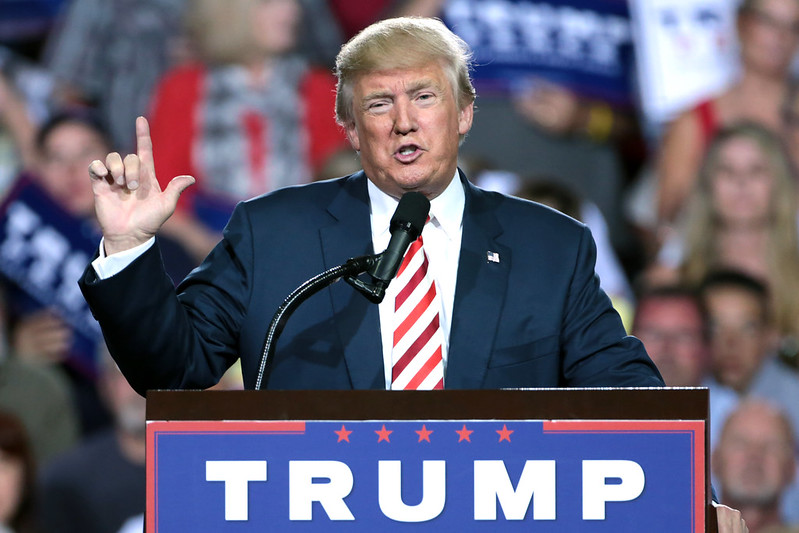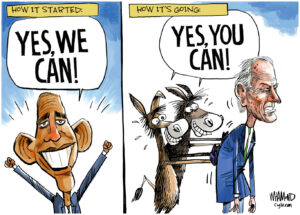The Trump Doctrine Demands a Democratic Response
The president’s foreign policy seldom matches his anti-war rhetoric. In 2020, it’s incumbent on his opposition to offer a true alternative. Gage Skidmore / Flickr
Gage Skidmore / Flickr
I’ve been publishing anti-war material for more than five years now. Seeing as I only retired this past February, I did most of my dissenting while still on active duty, and much of it during the Obama years. During that time, the overwhelming majority of hate mail in my inbox—and sometimes my actual mailbox—almost always came from the political right. Then Trump was elected, occasionally said some modestly prudent things about ending endless war in the Middle East, and when I dared write approvingly about those words, my hate mail began to change. Now it invariably emerges from the mainstream “left,” my own ostensibly ideological compatriots. (More on this phenomenon in my Nov. 6 column at antiwar.com). Now, despite spending almost all of my adult life in uniform, I’m labeled a “Putin apologist,” a “traitor,” an “asset” and a “useful idiot.”
It’s ironic; maddeningly so, in fact. A cursory glance at my body of work since January 2017 reveals a consistent propensity to challenge this president. Nonetheless, I’ve felt of late a professional, and ethical, obligation to occasionally (if cautiously) cheer Trump’s more prudent critiques of the forever wars I once waged. My more thoughtful critics note that all that Trump-talk hasn’t been backed by much follow-through, and they ain’t wrong. As I’ve been long apt to point out, the distance between Trump’s anti-interventionist “rhetoric” and his actual actions in the greater Middle East remains, for now, wide enough to drive a semi-truck through.
Still, in the interest of answering my critics, I thought it time to try—wildly difficult as it may be—to tease out something resembling a Trump “doctrine” for the region. As such, I hope to answer the vital question: what exactly is Trump up to in the Middle East? My tentative conclusion is, well, nothing new! The president’s sporadically anti-war language may be unique, but most of his policies adhere to the pre-9/11 formula of George H.W. Bush and Bill Clinton. Allow me to explain.
As long as he eschews an illegal, ill-advised war with Iran, Trump does seem committed—eventually—to removing at least some U.S. soldiers from direct combat and winding down our efforts at nation-building in the Muslim world. After the first Persian Gulf War, Clinton (and to a lesser extent Bush) largely avoided these missions. Nonetheless, even if American troops weren’t doing much of the killing or dying, Uncle Sam remained a hegemonic presence from West Africa to Central Asia. Dotting the landscape with army bases and warships, inflicting untold suffering in the form of economic sanctions on the regimes Washington didn’t like and backing the worst internal and external crimes of its favored despots, the U.S. was still experienced as a neo-imperial force in the everyday lives of Muslim peoples.
Trump employs the same old policies but they are sprinkled with his uniquely, even refreshingly, direct pronouncements and unabashed worship of regional strongmen. He gleefully fawns over Egypt’s military dictator, Gen. Abdel-Fattah el-Sissi—“a fantastic guy” who gunned down about 1,000 peaceful demonstrators in 2013, and runs a veritable police state. True, Sissi is secular and shares a common enemy in Islamist jihadis, but does he deserve to be the second-largest recipient of American military aid and the beneficiary of such hyperbolic praise? In reality, such policies alienate the people on Cairo’s proverbial “Arab street” and catalyze anti-American sentiment. Remember, there was a prominent Egyptian—Mohamed Atta—among the 9/11 hijackers. Al Qaeda’s current top dog, Ayman al-Zawahri, is also an Egyptian national.
In Israel/Palestine—to the extent it remains plausible to even use the term “Palestine”—Trump enthusiastically follows in the footsteps of his 1990s predecessors, backing every militarist Israeli encroachment and providing top cover against United Nations’ attempts to enforce (Israeli violations of) international law. Like Bush and Clinton, Trump ignores the plight of the millions of Palestinians living in an “open-air prison.” He’s gone steps further, however, in the following ways: Trump moved the U.S. embassy to Jerusalem, gave Israel the green-light to openly annex illegal West Bank settlements, recognized the 52-year (and similarly illegal) Israeli occupation of the Syrian Golan Heights, and dismissed the hundreds of peaceful protesters shot dead along the Gaza border as “all Hamas,” or “terrorists,” in a shocking resuscitation of far-right Israeli talking points.
In Syria, Trump rightfully, if clumsily, ended Obama’s foolish, all-risk, no-reward mission in northeast Syria. Problem is, he just as quickly reversed course and deployed an almost identical number of troops—including armored vehicles— to indefinitely “secure” Syria’s (relatively paltry) oil refineries in the area. One can’t help but marvel at Trump’s admission that the U.S. intends to “fight for the oil,” and that he’ll “perhaps, make a deal with an ExxonMobil or one of our great companies to go in there and do it properly.” Beyond the obvious immorality of risking American blood for oil, such actions constitute a clear violation of international law.
On that subject, Syrian strongman Bashar Assad seems to better grasp American foreign policy better than Trump himself, noting recently that the U.S. president is the “best type of foe” because he states his objectives plainly. The whole absurd, oil-snatching power play smacks of old-school extractive imperialism—and that won’t be lost on a suspicious, self-consciously post-colonial Arab populace. Oh, and it’s unclear Trump has an exit strategy for this venal new mission.
What’s more, Trump has sent at least three more troops to Saudi Arabia for each one he’s removed from Syria, for a military installment now in the thousands. What they’ll do there—assist in the execution of Saudi war crimes in Yemen or gear up for a disastrous new American war with Iran—remains unclear and illustratively unstated. What we do know is that Trump’s peculiar justification for the deployment, that the Saudi royals will foot “100%” of the bill, all but officially establishes the U.S. military as a mercenary force. Speaking of the war in Yemen—the world’s worst humanitarian crisis—when an asleep-at-the-wheel Congress finally got around to invoking the War Powers Act this year, passing a bill to cut off U.S. aid to the Saudi terror campaign, Trump subsequently vetoed the legislation. A hawkish, dysfunctional Congress lacked the votes to override the president, and so the war must go on.
If there is a Trump doctrine, then, it’s little more than a bombastic, in-your-face revival of Clintonism. Back Israel and assorted regional autocrats, abet those regime’s bad behavior, including the killing or starvation of countless brown folks, occasionally fling a few cruise or drone missiles at “terrorists” (at this, Trump has outpaced even the assassin-in-chief, Barack Obama), maintain ample U.S. military bases in the area (but out of rifle range), all while limiting the deaths of U.S. troops. Now I’m all for the latter, but the problem is two-fold: 1) Much evil is still done in our name, and, relatedly, 2) While most Americans remain oblivious to the mayhem their military wreaks abroad, the locals aren’t fooled. They see it, live it, suffer it every day. Their anger will inevitably boomerang back and inflict damage on U.S. troops and/or America’s cities.
Remember, the Clinton Doctrine didn’t end so well last time around. In fact, his strategy of loyally backing Israel, maintaining military bases near the Saudi “Holy Cities,” and sanctioning-to-death a half million Iraqi civilians found their reflection in Osama bin Laden’s three justifications for declaring war on the United States. (That he put these in writing made him more specific and transparent than George W. Bush, who issued a notoriously vague war resolution that Congress obediently rubber-stamped while smoke still billowed from the crumbled Twin Towers.)
As muddled as Trump’s foreign policy may be, the Democratic Party and American people ought to pay attention and take it quite seriously. If Democrats run on a foreign policy that reflexively opposes all the good in Trump’s anti-war rhetoric and keeps U.S. soldiers in harm’s way in a series of aimless wars, well, they’re apt to blow another election and hand Trump a second term.
Intellectually honest Democrats with real character, and a more informed and active citizenry, should, in fact, praise what’s sensible in Trump’s anti-interventionist rhetoric. Then they ought to hold his feet to the fire and force him to follow through. If he fails, when he fails, they should offer a more genuinely anti-war agenda in 2020. Of course, that seems like pure fantasy in today’s alarmist environment in which anyone consistently anti-war or even mildly complimentary of Trump’s more prudent remarks is considered a Russian asset. Still, if the republic is to stand, we must continue to dream.
If, as I fear, Trump’s endgame is to pull U.S. troops out of direct combat but leave the infrastructure of our Middle Eastern hegemony in place, a new Bin Laden could strike us on American soil. There are many waiting in the wings, and they only need to get lucky once. Then Trump or perhaps an even more hawkish successor will feel obligated to respond. An unimaginative Pentagon will follow the old Bush II or Obama playbook, and George Orwell—perhaps the original prophet of forever war—will roll in his grave, futilely screaming through six feet of soil, I warned you!
————
Danny Sjursen is a retired U.S. Army major and a regular contributor to Truthdig. His work has also appeared in Harper’s, The L.A. Times, The Nation, Tom Dispatch, The Huffington Post and The Hill. He served combat tours with reconnaissance units in Iraq and Afghanistan and later taught history at his alma mater, West Point. He is the author of a memoir and critical analysis of the Iraq War, “Ghostriders of Baghdad: Soldiers, Civilians, and the Myth of the Surge.” He co-hosts the progressive veterans’ podcast “Fortress on a Hill.” Follow him on Twitter at @SkepticalVet.
Your support is crucial…With an uncertain future and a new administration casting doubt on press freedoms, the danger is clear: The truth is at risk.
Now is the time to give. Your tax-deductible support allows us to dig deeper, delivering fearless investigative reporting and analysis that exposes what’s really happening — without compromise.
Stand with our courageous journalists. Donate today to protect a free press, uphold democracy and unearth untold stories.






You need to be a supporter to comment.
There are currently no responses to this article.
Be the first to respond.